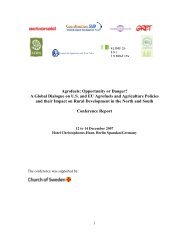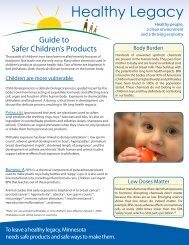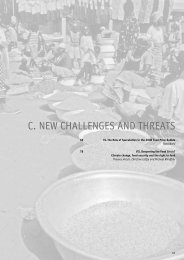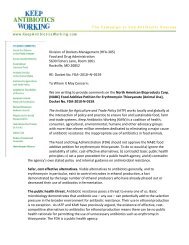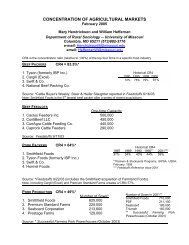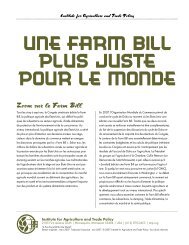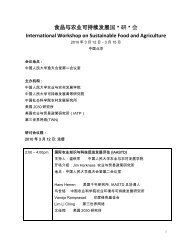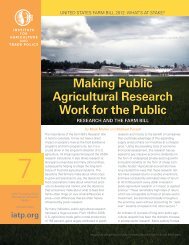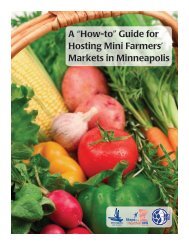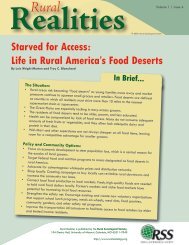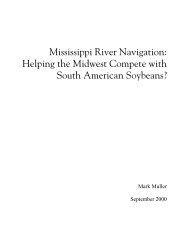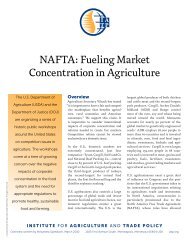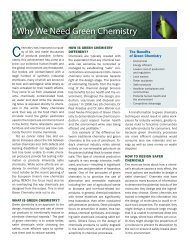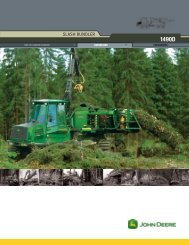IATP Hog Report - Institute for Agriculture and Trade Policy
IATP Hog Report - Institute for Agriculture and Trade Policy
IATP Hog Report - Institute for Agriculture and Trade Policy
You also want an ePaper? Increase the reach of your titles
YUMPU automatically turns print PDFs into web optimized ePapers that Google loves.
Section 5<br />
Pollution Shopping by Corporate Interests<br />
Animal factories engage in a <strong>for</strong>m of "pollution shopping" by locating in<br />
communities or other geographical areas where few regulations exist that<br />
could impede their growth or where few people live who could mount<br />
strong opposition.<br />
Corporate hog factory owners often target communities where a high<br />
percentage of residents are impoverished, disenfranchised, unorganized,<br />
<strong>and</strong> underemployed or unemployed, ensuring little or ineffective<br />
opposition.<br />
When people of color populate these communities, this <strong>for</strong>m of pollution<br />
shopping has been termed "environmental racism" <strong>and</strong> is a matter of great<br />
concern to environmental justice organizations. 23<br />
According to activist Gary Grant of Halifax Environmental Loss<br />
Prevention, Halifax County, North Carolina, there are 100 counties in<br />
North Carolina, of which fifteen are the top hog-producing counties. 24<br />
Fourteen out of the fifteen rank in the bottom 50% of North Carolina's<br />
state family income ranking. Thirteen out of the 15 have a 25% or higher<br />
African-American poverty rate. In Grant's words, "the corporate hog<br />
industry is not an example of economic development but rather another<br />
example of under development, just like the other unskilled, low-wage<br />
hazardous industries such as sewing factories, textile mills, <strong>and</strong> poultry<br />
processing plants." 25<br />
It is commonly heard that if hog factories are not allowed to operate<br />
without restrictions in the United States, the hog industry will move to<br />
other countries. <strong>Hog</strong> factory supporters have used this claim to gain the<br />
public's support <strong>for</strong> their opposition to regulations on hog factory location<br />
<strong>and</strong> practices. Speaking of the expansion of Virginia-based Smithfield<br />
Foods outside U.S. borders, their chairman <strong>and</strong> CEO Joe Luter claimed,<br />
"the current hostility from interest groups in this country has made other<br />
parts of the world look good to us." 26<br />
However, corporate hog factories are moving to other countries even<br />
though areas remain in the United States that are favorable to their<br />
expansion here. Carroll's Foods, Inc., was the first corporate hog producer<br />
to operate factory hog operations outside the United States with two<br />
operations in Brazil. 27 Carroll's also has a 1,300-sow hog factory outside<br />
the village of Perote near Mexico's Gulf Coast, about 150 miles east of<br />
Mexico City. Smithfield Foods, Inc., owns Carroll's.<br />
Smithfield Foods, Inc., has a 50% ownership interest in a Mexican meat<br />
http://www.iatp.org/hogreport/sec5.html (6 of 38)2/27/2006 3:50:13 AM



